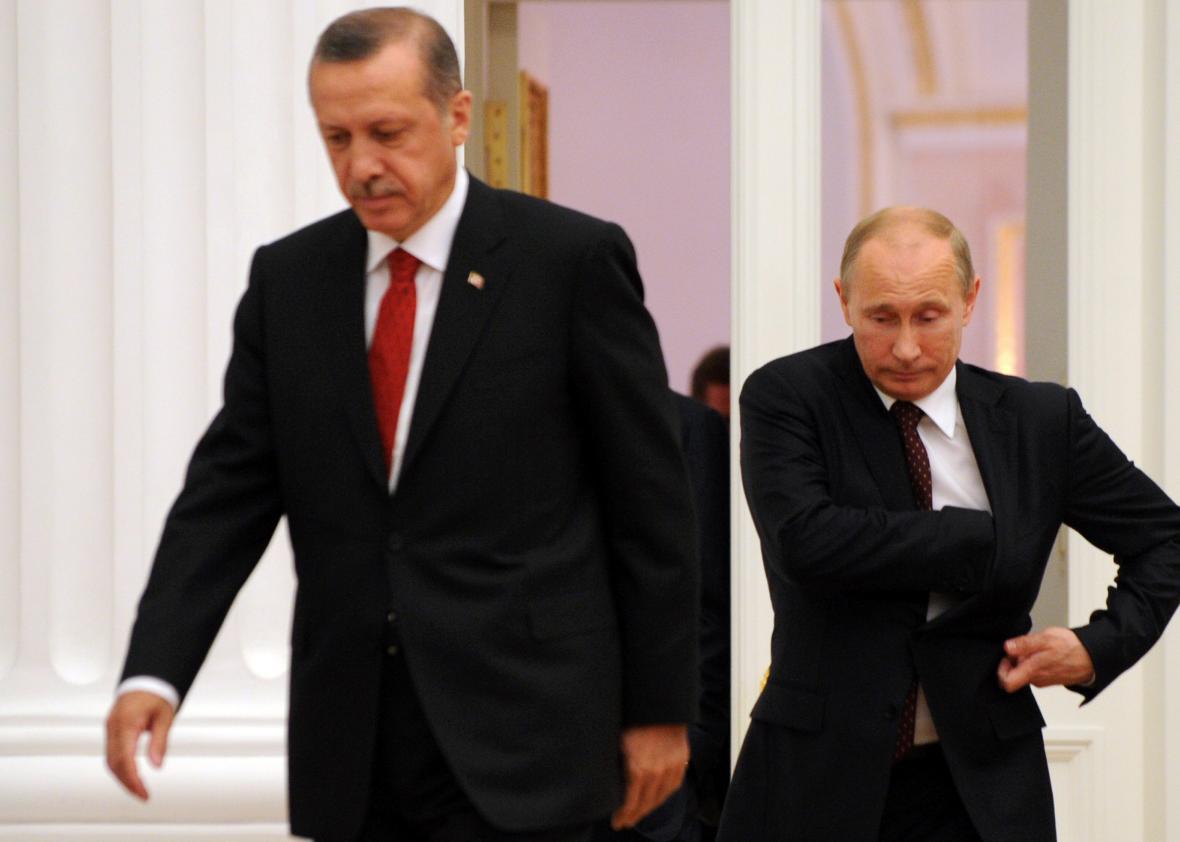Whatever post-Paris unity there might have been in the fractious coalition of nations fighting ISIS in Syria crashed and burned on the Syria-Turkey border on Tuesday as Turkish F-16s shot down a Russian SU-24 fighter.
Turkey, which has previously protested Russian violations of its airspace and shot down an unmanned Russian drone in October, says the Russian fighter had entered its territory, which Russia denies.
Further raising the stakes, a group of Turkmen rebels in northern Syria, who have recently been supported by Turkish airpower, claim to have killed the two Russian pilots. Russian President Vladimir Putin called the incident a “stab in the back,” accusing NATO, of which Turkey and the United States are members, of being accomplices of ISIS. He promised “significant consequences, including for Russia-Turkish relations.”
Putin’s tough rhetoric aside, this is unlikely to lead to direct military confrontation between Russia and NATO-member Turkey. As veteran Russia-watcher Mark Galeotti lays out, the risks to both sides are just too great for this to dissolve into even an overly aggressive diplomatic confrontation. In this situation, that’s what counts as good news.
But the implications for the Syrian civil war, and the separate but related international campaign against ISIS, could be significant. The incident comes just as French President François Hollande arrives in Washington on the first stop of a trip aimed at a building a coalition to take more significant military action against ISIS. His next stop is Moscow. While the U.S. has viewed the Russian intervention in Syria with suspicion because of Russia’s support for Syrian President Bashar al-Assad and attacks on non-ISIS rebels, France has been more open to the idea of working with the Russians. France, tellingly, did not invoke NATO’s mutual defense clause after the Paris attacks—as the U.S. did after 9/11—possibly as a form of outreach to NATO-wary Moscow.
And recent days had actually given some rare cause for hope that the international coalition could get on the same page. In the wake of the bombing of a Russian passenger plane over Sinai—for which ISIS claimed responsibility—Russia finally began serious airstrikes on Islamic State targets in Syria after weeks of focusing its fire on anti-Assad rebels. More significantly, it alerted the United States to those strikes. On the diplomatic front, outside powers including Russia, Iran, the United States, France, and Turkey made more progress than was expected on developing a plan for a cease-fire between Assad and the rebels during a meeting in Vienna one day after the Paris attacks.
After Tuesday, Russia is unlikely to build on cooperation with NATO forces in Syria. Not surprisingly, Russian Foreign Minister Sergei Lavrov has called off a planned trip to Turkey. Putin may also redouble the country’s campaign against Turkish-backed rebel groups in Syria and its support for the Assad regime. Turkey and the Gulf states had been pushing at Vienna to expand the number of rebel groups viewed as “legitimate” opposition, which Russia, Iran, and their Syrian proxies are now more likely to reject.
Under the best circumstances, Turkey and Russia would both be highly problematic partners in any project aimed at destroying ISIS. Russia is more interested in defending a Syrian regime that has abetted the Islamic State’s rise. Turkey has only belatedly joined U.S.-led airstrikes against ISIS, but has also continued to bomb the Kurdish fighters that have been the most effective force in fighting ISIS on the ground. Still, given their deep involvement in the conflict, it’s hard to imagine any meaningful political settlement in Syria without Turkey’s cooperation.
All in all, this was a good day for the Assad regime and for ISIS.
